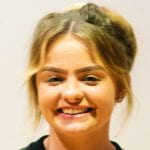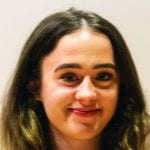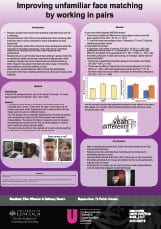by Bethany Raven & Ellen Wheeler //

 Our UROS project provided us with the chance to investigate whether working in pairs can lead to improvements in unfamiliar face matching, which previous studies have shown to be difficult. This issue causes real-world problems, as person identification is important for security services around the world, for example at passport control. We were particularly interested to see if the initially worse participant in each pair improved when working with the initially better participant. As part of our study, we filmed the pairs to investigate how working in pairs led to improvements for the worse person.
Our UROS project provided us with the chance to investigate whether working in pairs can lead to improvements in unfamiliar face matching, which previous studies have shown to be difficult. This issue causes real-world problems, as person identification is important for security services around the world, for example at passport control. We were particularly interested to see if the initially worse participant in each pair improved when working with the initially better participant. As part of our study, we filmed the pairs to investigate how working in pairs led to improvements for the worse person.
One thing we found challenging was recruiting the participants. The pairs had to be friends, this restricted us as finding a pair of people that both knew each other and had availability at the same time. A further challenge arose towards the end of the data collection when we learned that in 2 out of the 22 pairs we had tested, both individuals ended up with the same overall score, meaning we would not be able to identify who was the better or worse participant. This was challenging as this study was based upon observing the better or worse of each pair. To overcome this issue, we tested another two pairs, who did score differently, so they could be used in later analyses.
Another challenge we had to face was having to conduct the research separately. Both of us and our supervisor were together when collecting the data. However, we went home for the summer period, which meant we had to complete the rest of the research from home. We overcame this challenge by having a ‘shared drive’ which we could all share documents on. This meant that our supervisor could oversee and provide guidance through every step. Also, we were able to meet up and work together sometimes.
We have learned to work well in a team, by splitting the workload evenly and supporting each other. We have learned how to run an experiment in MATLAB, which neither of us had used before, showing us both that we are able to adapt and learn new skills.
Our supervisor Robin was amazing, as he gave us guidance every step of the way. Any issue or query we had, we were able to communicate with him and he was able to help. We both learned from Robin, he introduced us to new techniques and ways of thinking which will be beneficial to the rest of our studies. Even though he was always available to help, he still gave us the independence we needed for the research.
UROS has been particularly useful in preparing us for future academic endeavours such as our dissertation. It has given us an insight into how research is conducted and allowed us to develop the professionalism expected in this field of research. We will carry these lessons throughout our studies and onto postgraduate studies, which thanks to UROS will be something we would both like to pursue.
*To view Bethany & Ellen’s project poster, please click on the thumbnail below:

